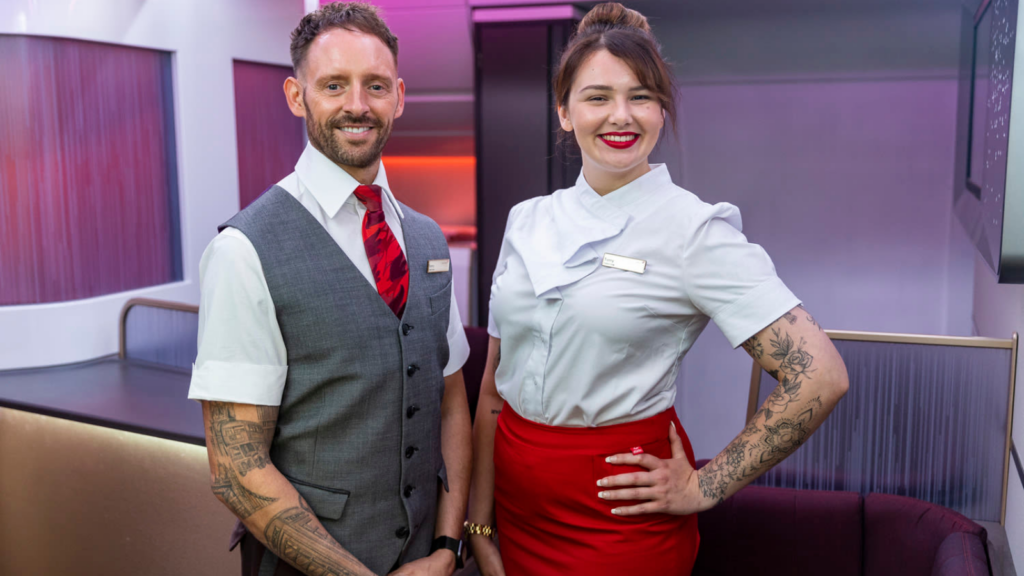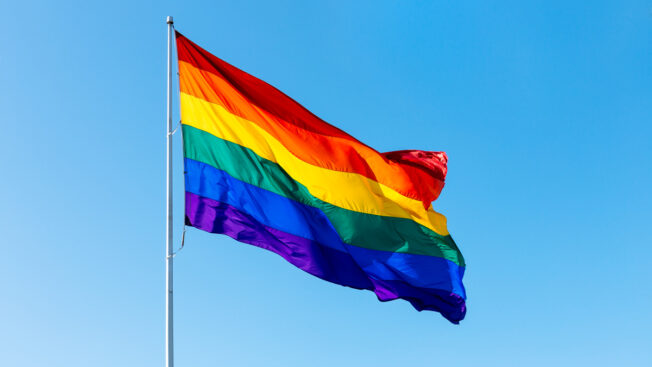Virgin Atlantic Is Not Doing Inclusion Quietly
Don’t miss Brandweek, Adweek’s ultimate experience for marketers, September 11-14 in Miami. Connect with peers and gain insights and inspiration from top brand marketers and industry icons at Glossier, Coca-Cola, Taco Bell and more. Register.
We live in an era that’s been defined in part by the ugliness of the culture wars pervading media. Nevertheless, major brands have attempted to widen their consumer bases by proactively representing and championing LGBTQ+ communities.
But post-pandemic, one aviation brand in particular has caught the attention of travelers by showcasing its internal mantra of being “different” while offering an inclusive message.
In April 2022, as air travel looked to regain its footing following the heavy impact of the Covid-19 pandemic, Virgin Atlantic released its brand campaign “See the World Differently.”
The British airliner is majority owned by Virgin Group and currently flies to 34 countries across five continents, including 15 cities across the U.S. and five in the U.K. According to its 2022 financial statement, the airline’s vision is to be “the most loved travel company.”
The report read: “By harnessing the power of our people, our purpose and our brand, we will deliver [the] most loved journeys for our customers through thoughtful experiences that feel brilliantly different at every opportunity.”

With travel once again opening up at the end of the first quarter and demand on the rise, Virgin Atlantic would go on to record end-of-year revenue of $3.6 billion (2.85 billion pounds) for 2022, coming close to pre-pandemic revenue from 2019 of $3.7 billion (2.9 billion pounds).
I wanted to make sure that we were really sensitive, really diligent to how that was going to be so that it felt truly joyous, but also purposeful.
Annabelle Cordelli, vp of global marketing, Virgin Atlantic
Also cited in the report, “See the World Differently” was highlighted as having delivered a 1.1-point uplift in brand power. It also led the way for the company’s “Be Yourself” manifesto, which encouraged its employees express their identities freely in the workplace, introducing relaxed policies around visible tattoos, gender identity and uniforms to instill a sense of inclusion and belonging. That would be promoted through a follow-up campaign in the autumn featuring TV host and producer Michelle Visage.
Meanwhile, according to advertising effectiveness platform System1, the “See the World Differently” campaign may have begun a trend of advancing creative, having received a score of 4.2 out of 5 on its testing metrics. This was then outperformed by British Airways’ “Every Reason You Fly” campaign, which was released in October 2022 and achieved a score of 4.5.
Devising a brand focus on inclusion
While it placed LGBTQ+ inclusion at the forefront for the first time, Virgin Atlantic’s vp of global marketing Annabelle Cordelli said the campaign was no different in terms of how any brand campaign would be developed, with the same fundamentals applied: “You’ve still got to be clear about what you’re trying to do.”
The resulting campaign was a vibrant 1-minute spot featuring a highly diverse group of cabin crew as well as passengers interacting around the airport and a Virgin Atlantic plane, set to Gloria Gaynor’s anthemic “I Am What I Am.”
Cordelli explained that in developing the campaign, once an agreement was reached on what it wanted to convey, she approached the airline’s internal networks to discuss every element, from the words to how the message was expressed.
A specialist consultant was hired to ensure the casting and styling of each character would tell their individual stories and convey the trips they were taking and the experiences they were on. Consumer testing was also key.
“I wanted to make sure that we were really sensitive, really diligent to how that was going to be so that it felt truly joyous, but also purposeful at the same time,” she explained.
While the campaign conveyed a new message for Virgin Atlantic, Cordelli stressed that it still had to feel true to the brand. Moving away from heritage is not likely to deliver a marketer’s objectives otherwise, she believes.
“You’ve got to find your way, depending on your brand and your business, and what your objectives are,” she advised around delivering any campaign message that centers on DEI. “If you have got a right to talk about something in a particular space, then I think you’ve just got to really make sure that you are consulting in the right way, learning in the right way, talking about it once you’ve got strategically something that works.”
Cordelli pointed out that no single person can be an expert in every diverse group, making research and consultation vital. Doing the extra work and taking feedback around the details of the messaging and the potential sensitivities will bring confidence to a campaign in advance of production and distribution.
“You really need to use the power of diverse experience and breadth depending on what you’re doing,” she added. “It’s hard, and I don’t think everyone will get it right, and that won’t be from not doing all of the due diligence either. There’s just got to be an element of honesty where, if you don’t get it right, how do you learn and try again with something where the intent is the right one?”
Marty Davies, co-chief executive of LGBTQ+ organization Outvertising, praised the campaign’s policy change toward introducing a gender-neutral uniform and pronoun badges for cabin crew, as well as the use of the “gay anthem” originally sung by Gloria Gaynor. “This is why our community found it appealing—the brand was doing the work.
But, Davies noted, the company didn’t entirely stand behind the campaign: “What undercut their efforts was when, just two months later, they temporarily suspended the policy for flights to the World Cup in Qatar.”
Also applauding the inclusive approach and the move away from legacy PR-led campaigns, which saw Virgin Group founder Richard Branson often flanked by several stewardesses in their signature red uniforms, is Jan Gooding, former chair of Britain’s LGBTQ+ charity Stonewall and previously the global inclusion director at Aviva.
“Part of the brand’s challenger credentials have always been informality, fun and the celebration of individuality, so a focus on crew clothing as a way of demonstrating ‘seeing the world differently’ was sound,” she said, adding that it was “a breath of fresh air to see big brands taking a stand for acceptance.”
https://www.adweek.com/brand-marketing/virgin-atlantic-inclusive-marketing-annabelle-cordelli/
